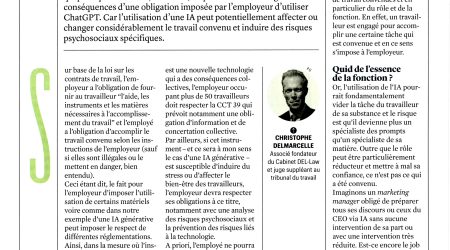Lying on your CV
Posted the 22 January 2020In December, the new CEO of Proximus was accused of having lied on his C. V. In reality, it was his previous employer who had ‘upgraded’ the qualifications of a training course he had taken.
But what does an employee risk if he really has lied about his qualifications?
Can Lying on a CV Lead to Dismissal?
According to some professionals, up to three out of four CVs are misleading. This has led employers to increasingly rely on pre-employment checks, the legality of which I have previously commented on in this column.
The question raised by the controversy surrounding the lnsead diploma of Proximus' new CEO is whether an employee who deceived their employer by claiming a degree they never obtained or providing false professional experiences and qualifications can be dismissed for gross misconduct after being hired. In employment law, gross misconduct is defined as any action so severe that it makes the continuation of the employment relationship immediately impossible due to the complete loss of trust it causes the employer to have in the employee.
The Duty of Good Faith
It should first be noted that Collective Agreement No. 38, which governs the rights and obligations of candidates and employers during the recruitment process, does not solely impose obligations on employers. It also requires employees to provide all necessary information about their professional background and studies that are relevant to the nature and conditions of the role. More importantly, it obliges candidates to participate in the selection process in good faith. This obligation is logical since, like any contract, an employment contract assumes both parties act in good faith during its formation and execution.
Lying about degrees, career history, or professional skills therefore constitutes a breach of the legal obligation of good faith and the requirement to disclose necessary information to the employer to assess a candidate’s suitability. Worse, falsifying or fabricating a diploma constitutes forgery and the use of forged documents, which can also qualify as gross misconduct.
Gross Misconduct
As a result, and irrespective of the question of consent defects (e.g., fraud or pre-contractual bad faith) that could affect the employment contract, or the specific rules for regulated professions (lawyer, notary, doctor, etc.) where criminal sanctions may apply, such deception can clearly justify dismissal for gross misconduct if the severity of the act breaks the employer’s trust entirely.
The Labour Court of Liège, in a ruling on March 25, 2011, judged that "an employee who gives the impression of having obtained a university degree when this is not the case" is guilty of gross misconduct. Similarly, the Labour Court of Brussels, in a ruling on October 28, 2001, found that falsely claiming to have professional activities requiring a specific degree during the hiring process, when in reality the worker did not possess such a degree, constituted gross misconduct.
Deception by a CEO Will Be Judged More Harshly
Depending on the candidate’s role and level of responsibility, the degree of trust placed by the employer and the level of accountability will result in stricter assessments of the severity of the misconduct. For instance, a CEO’s deception would likely be judged more harshly than that of a lower-level employee.
That said, some may argue that employers are responsible for verifying the CVs submitted to them, and a failure to perform such checks could mitigate the severity of the employee’s misconduct, potentially invalidating dismissal for gross misconduct.
As is often the case in such matters, an assessment will need to be made on a case-by-case basis, given the lack of uniformity in court rulings.
Related articles

Is an employer allowed to mandate the use of artificial intelligence tools by employees ? (Trends, 17-07-2025)

Caution if a former colleague opposed to your employer asks you to testify in their favor
